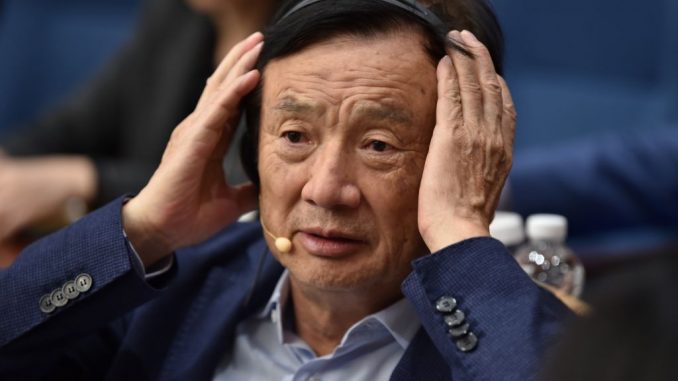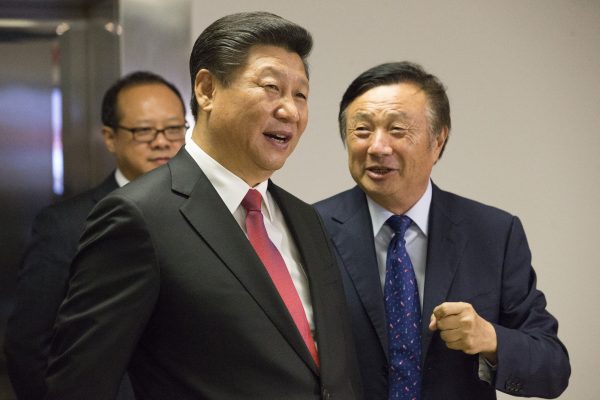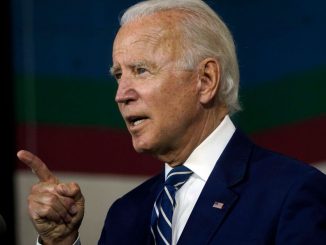
Ren Zhengfei, the founder and CEO of Chinese tech giant Huawei, said in an internal speech last month that if parts of the business slowly move to the capital market, the manipulation of finances would be a legal problem. His words have led to speculation that Huawei may go public, as U.S. sanctions against Huawei have made its cash flow a big issue.
In April last year, in an online interview with the South China Morning Post, Ren said that Huawei would “probably go public in 3,000 years.”
One reason why he said that Huawei would not go public may be its shareholder structure.
Hong Kong-based economist Larry H.P. Lang described Huawei’s corporate structure as “globally unique,” with registration information on China’s Shenzhen credit website showing that Huawei Investment & Holdings Co. has only two shareholders—the Labor Union Committee, which holds 99 percent of the shares, and Ren Zhengfei, who holds 1 percent.
The union holds restricted phantom shares, and the more than 100,000 employees it represents have no equity certificates and can only get dividends. They cannot buy or sell the shares.
According to Lang, when it comes to Huawei’s capital increase, dividends, and personnel appointments, its shareholder meetings have been attended by only two shareholders, Ren and Chairman Sun Yafang.

Previous conjecture in the Chinese media about Huawei’s reasons for not going public, besides its opaque corporate structure, was that it already had sufficient capital and didn’t need to go public to raise money. Notably, going public would require disclosure of the company’s financial statements and other information, which might interfere with Huawei’s longer-term plans.
In 2012, the House Intelligence Committee asked Huawei to provide detailed information about its ownership structure, including a list of its top 10 shareholders, but Huawei refused.
“The Committee finds that Huawei did not fully cooperate with the investigation and was unwilling to explain its relationship with the Chinese government or Chinese Communist Party [CCP], while credible evidence exists that Huawei fails to comply with U.S. laws,” said the Committee in its investigative report (pdf).
The United States and other Western countries suspected Huawei of accepting subsidies from the CCP and then beating Western telecommunications companies to the 5G market by offering low prices and attempting to set new international standards to realize the CCP’s strategic ambition of controlling global 5G.
On March 12, the Federal Communications Commission (FCC) (pdf) designated five Chinese companies, including Huawei, as “a threat to national security” and placed them on a list of unreliable suppliers. The FCC is required to publish and maintain a list of communications products and services that pose an “unacceptable risk to national security.”
Huawei’s Cash Flow is Tight
In a recently published speech delivered on March 30, Ren said there would be “no manipulation of accounts,” an important assessment criterion for cadres to fulfill their responsibilities, because “if some parts of the business slowly go to the capital market in the future, manipulating accounts will be a legal issue instead of a disciplinary issue.”

There is speculation that Huawei may divest itself of some of its businesses, such as Huawei Mobile or Huawei Cloud, and spin them off to list separately or sell to ease its tight capital flow problem.
According to Huawei’s 2020 annual financial report released on March 31, Huawei’s cash flow statement showed it had $5.44 billion by the end of last year. It is the lowest in the past five years, down 61.5 percent from the previous year.
In order to survive and address the restrictions on equipment sales and future sustainability under the sanctions, Huawei has increased its independent R&D in the past two years, spending $20 billion and $22 billion in 2019 and 2020 respectively, more than half of the $74 billion Huawei has invested in R&D in the past 10 years.
Huawei’s rotating CEO Xu Zhijun admitted that the multiple sanctions imposed by the United States have been a fatal blow to Huawei. In order to avoid future supply chain breakage, Huawei has changed its previous practice of zero reserves and has stockpiled a large number of chips, which added to its capital flow pressure. Huawei spent $11.1 billion, $14.9 billion, and $21.4 billion on hoarding chips in 2017, 2018, and the first half of 2019, respectively. This is a net increase of $10.2 billion in two and a half years.
In the past year, Huawei has made some big moves including selling Honor, its main cell phone brand, for $40 billion. Before that, Huawei issued bonds domestically in 2019, accumulating $3.6 billion in domestic bond sales. In addition, Huawei has denominated bonds totaling $4.5 billion, making its total domestic and overseas bonds reach $8 billion.
In another big move earlier this month, Huawei spun off its Huawei Cloud business, with Xu as chairman of Huawei Cloud and Yu Chengdong, executive director and CEO of the Consumer BG, president of the Cloud & AI BG, as CEO of Huawei Cloud. Chinese media quoted sources as saying, “Huawei Cloud may go public, or be sold first, like Honor.”
Cloud computing is a business that requires huge investment, and Huawei Cloud may need to be listed or sold to leverage external capital to address its huge initial investment. The other two Chinese cloud computing giants are also investing heavily, with Alibaba announcing last year that it will invest $31 billion in Aliyun, or Alibaba Cloud, over the next three years and Tencent investing $77 billion in its cloud business over the next five years.





Be the first to comment